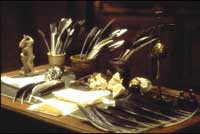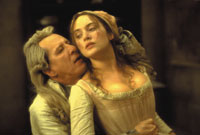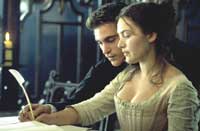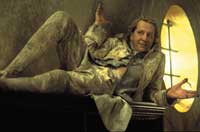
Quills
©20th Century Fox Film, all rights reserved
Fox Searchlight Pictures

|
The immense structure of this film is one the Marquis de Sade would have greatly
appreciated. It blends the horrors of the madhouse with the eccentricities of
everyday life. Some are born in perversity, some achieve diversity, and some have
both thrust upon them.
It's often hard to bring your message to the crowd, especially when locked up and
prevented from doing so. Theatrical presentations (like those at Charenton,
immortalized for living memories in the work of Peter Weiss) are one way of
achieving notoriety and literature has spread its proverbial wings since the days of
Gutenberg and Griffith. Cinema achieves similar results to vellum, but the stirring
message behind the hidden veil suspended before us in the dark often needs some
prodding by an attentive listener. Words can be dangerous things. When such
words are transmitted freely and sown both softly and unexpectedly into the thoughts
of the unaware and uninitiated, their growth can implement itself with a power
instantaneously comprehended only by a select few. In the past, such
considerations were responsible for the dire plight of the divine Marquis. His problem
was not so much that he couldn't keep his mouth shut, but that he couldn't keep his
quill from quivering.
Quills
©20th Century Fox Film, all rights reserved
Fox Searchlight Pictures

|
When a creative man is confined between four walls, it does not bear imagining what
the imaginings can be. The Marquis did not have a happy life nor, if we analyze his
writings rather circumspectly, a fulfilling one. Undoubtedly, his sweetest treasures
could be held in the grip of one hand. An anarchist of admirable standing (we shall
use this word sparingly), he was kept from having too strong an influence upon the
masses through measures taken by others to keep his messages silenced (though
perhaps not silenced with such overt physical cruelty as ultimately imposed upon him
in this film).
Director Philip Kaufman has delivered another devastatingly enjoyable movie.
Shifting elegantly time and again into events that almost pop-out of the Marquis' own
tales, we meet chambermaids, priests, nuns, aristocrats, dirty old men, virgins,
architects, pyromaniacs, rapists, murderers, and all variety of people we might easily
encounter on the streets of any civilized metropolis today. All in all, it's a familiar
surrounding, although many viewers might not recognize that so quickly, considering
the costumes and period in which it's been placed. Of course, this is only fitting
because it is tied in a fashion to the life and times of the lascivious Frenchman. Like
any obsessive, Donatien proves that you can never get enough of a good thing. In
his case, the preference was for the written word and the sexual fantasy, in no
decipherable order of preference. Quite an accommodating combination it is, too,
when one realizes that one obsession easily supplements the other in a never-ending
relay race of ecstatic indulgences. Speaking of indulgences, the priest in charge of
the proceedings at Charenton appears less than competent in controlling or
correcting the escapades of the naughty Marquis and equally at odds with his own
internalized emotional turmoil. What a state for the church to be in! Of course,
Quills
©20th Century Fox Film, all rights reserved
Fox Searchlight Pictures

|
sharing the chambers of Charenton turns the priest and the libertine into cellmates of
a kind and they pass their time trying to draw out adverse qualities from each other to
evoke either religiosity or sensuousness. The Marquis presented in this film is not
necessarily an evil man; he just can't help himself. The devout follower of the "City of
God" doesn't fare much better in his attempt to sail merrily along with the gracious
good; he too is a victim of his own human nature. We are, after all, only men. (That
includes the women, too.)
The good Abbé Coulmier (Joaquin Phoenix) does his best to alter the ways of the evil
minded Marquis (Geoffrey Rush), but finds his mettle tested once he must act in
accord with the dictates of the evil and vengeful Dr. Royer-Collard (Michael Caine).
Central to the proceedings are the activities of the delectable chambermaid
Madeleine (Kate Winslet), who goes about her daily chores collecting linen and tales
while enticing both the Marquis and the priest. The spellbinding actors in the leading
roles as well as the abundance of talent romping around in supporting roles captivate
us as we travel the corridors of the asylum. Geoffrey Rush is sublime, especially as
he prances about ensconced in his own creations ("One chapter for each cheek.").
The script, adapted by author Doug Wright from his Obie-award winning play, reflects
an appreciation of the enchanting De Sade's work which is equally apparent both in
Wright's deliciously clever word-play ("Imagine, an entire religion built upon an
oxymoron.") and Kaufman's playfully serious direction ("I thought it vital that everyone
discuss everything with each other and work out all of the relationships and cross-
relationships."). One moment it is impossible not to delight at the prickling capers,
Quills
©20th Century Fox Film, all rights reserved
Fox Searchlight Pictures

|
another not to cringe from the impending disasters. Though some may be enthralled
by the melodramatic finale which ensues once lunacy reigns and after the Marquis
reaches his demise in the bowels of hell, the chain of events occurring post mortem
turn the postscript into something as gently flawed and enthusiastically pursued as
one of De Sade's more childlike fantasies.
Layer upon layer is built up throughout the film with the awe-inspiring contributions of
the entire cast and crew, including production designer Martin Chills, art director
Steven Lawrence, set decorator Jill Quertier, costume designer Jacqueline West, DP
Rogier Stoffers, and editor Peter Boyle.
This is no blood-and-guts, oversexed, slasher-dasher: this remains a beautifully
crafted film that exquisitely captures the essence of the divine Marquis. One can
almost imagine him smiling, were he still around to watch it; surely his followers will
feel their lips curl in delight. Take a seat in a "calming" chair, have a glass of wine
perhaps, and contemplate how divine lubrication is in facilitating the appreciation of
fine dialogue among other things.
Now added to the list of fascinating films (for varying reasons) related to the French
Marquis which already includes Peter Brook's "Marat/Sade" (1966), Pasolini's "Salo"
(1975), Roland Henri Xhonneaux's "Marquis de Sade" (1989) and Cy Endfield's
"DeSade" (1969) is Philip Kaufman's "Quills". Free your spirit and go to see this film.
 A DON'T MISS A DON'T MISS
It only remains to imagine what might be in store for us with Kaufman's next movie
about the life and times of Liberace (written by Jason Friedberg and Aaron Seltzer).
© 1994-2006 The Green Hartnett
|

